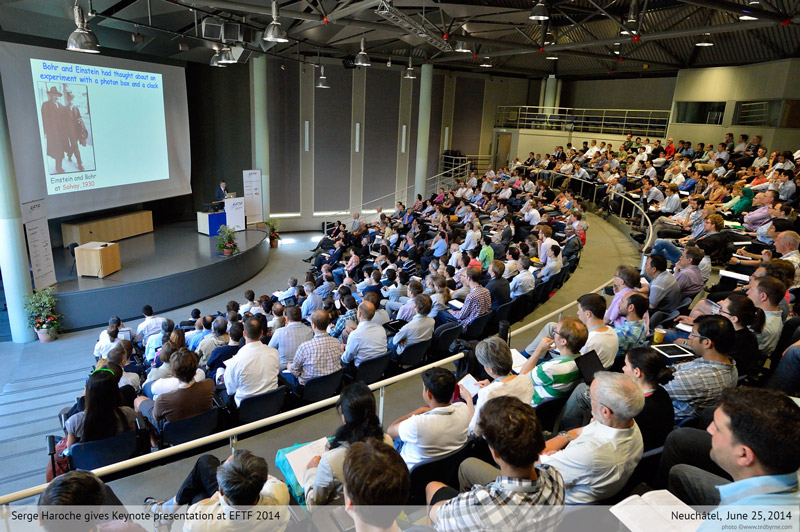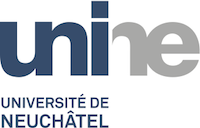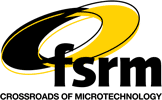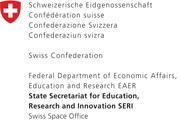The organizers would like to thank all participants, exhibitors, authors and sponsors for making EFTF 2014 a great success! Remember to save the date for next year in Denver - April 12-16, 2015.
Some media links are now available:
click image to zoom
EFTF 2014
Announcing the European Frequency and Time Forum, being held in Neuchâtel, Switzerland from June 23-26, 2014. This edition marks the 28th in a series of successful meetings that started in 1987.
The European Frequency and Time Forum (EFTF) is the premier technical conference in Europe for time and frequency products and related technologies. They bring together researchers and technologists from manufacturers, service providers, operators, application developers, National Metrology laboratories, defence timing, and standards bodies to share the latest information and promote the development of precise time and frequency systems and components.
Tutorials on Monday 23 June 2014 (info)
Conference on 24-26 June 2014
VENUE : The University of Neuchâtel, Neuchâtel, Switzerland
2014 Local Organization Chair – Steve Lecomte, CSEM
2014 Chairman of the Scientific Committee – Gaetano Mileti, University of Neuchâtel
2014 EFTF Executive Committee Chair – Ekkehard Peik, PTB
Conference Topics:
Group 1: Materials, Resonators, & Resonator Circuits
- Fundamental Properties of Materials
- Micro/Macro-Fabrication Technology for Resonators and Filters
- Theory, Design, and Performance of Resonators and Filters, including BAW, FBAR, MEMS, NEMS, SAW, and others
- Reconfigurable Frequency Control Circuits, e.g., Arrays, Channelizers
Group 2: Oscillators, Synthesizers, Noise, & Circuit Techniques
- Oscillators – BAW, MEMS, and SAW
- Oscillators - Microwave to Optical
- Heterogeneously Integrated Miniature Oscillators, e.g., Single-Chip
- Synthesizers, Multi-Resonator Oscillators, and Other Circuitry
- Noise Phenomena and Aging
- Measurements and Specifications
- Timing Error in Digital Systems and Applications
Group 3: Microwave Frequency Standards
- Microwave Atomic Frequency Standards
- Atomic Clocks for Space Applications
- Vapor-cell Atomic Clocks and other cell-based sensors and instruments
- Atomic interferometers
- Fundamental Physics tests with Clocks, and other Applications
Group 4: Sensors & Transducers
- Resonant Chemical Sensors
- Resonant Physical Sensors
- Vibratory Gyroscopes & Magnetometers
- BAW, SAW, FBAR, and MEMS Sensors
- Transducers
- Sensor Instrumentation
Group 5: Timekeeping, T&F Transfer, Telecom and GNSS applications
- TAI, Timescales and associated Algorithms
- GNSS and Applications
- Telecom Network Synchronization
- Time and Frequency transfer
- Frequency and Time Distribution and Calibration Services
Group 6: Optical Frequency Standards and Applications
- Optical Ion and Neutral Atom Clocks
- Optical Frequency Combs and Frequency Measurements
- Ultrastable Laser Sources and Optical Frequency References
- Ultrastable Frequency Transfer between Optical, Microwave, Terahertz and XUV domains
- Fundamental Physics tests with Clocks, and Other Applications
Student Paper Competition: Students submitting abstracts for presentation are invited to participate in a student paper competition. To participate, the student must be the lead author and present the paper. If the paper is selected for oral presentation, the student must also provide a poster to participate in the competition. Winners will receive an award and a certificate. Further information is on the conference web site Student information. Student authors selected for the Student Paper Competition will be given preference for travel support. A request to be considered for the student paper competition must be made at the time of abstract submission.
Tutorials: On Monday, 23 June 2014, there will be a series of tutorials covering a wide range of related topics. The tutorials include both the fundamental topics of frequency and timing at a level suitable for practitioners new to the field, and more advanced and specialized topics related to specific areas. As such, the tutorials aim to provide useful knowledge to the beginners in the community, as well as those with extensive experience. Detailed information will be posted on the Tutorial page (available shortly).
Exhibition: A technical exhibition will be held during the conference. Detailed information can be found on the Exhibition page.
Working Language: The working language of the conference is English, which will be used for all printed material, presentations, and discussions.





















